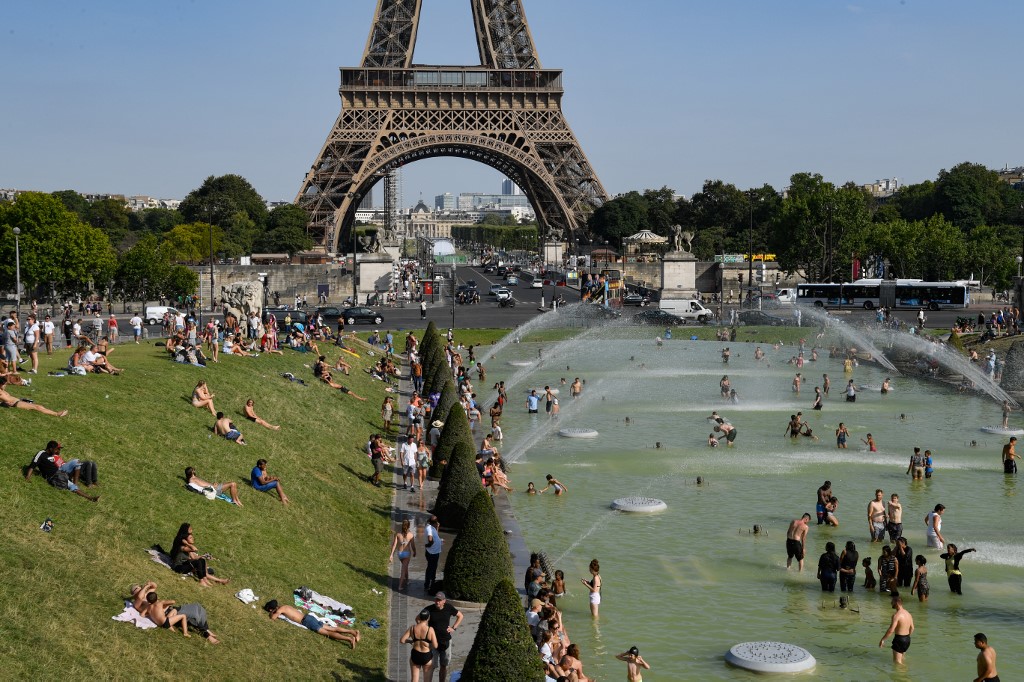
by Adam PLOWRIGHT
Agence France Presse
PARIS, France (AFP) — Trains were slowed down and holidaymakers flocked to swimming pools, beaches and lakes in western Europe on Wednesday as another heatwave set new temperature records.
A host of French cities saw their highest levels since records began on Tuesday, with wine capital Bordeaux recording 41.2 degrees Celsius (106.16 Fahrenheit), beating the previous high of 40.7C registered in August 2003, weather service Meteo-France said.
Forecasters predicted new temperature highs in neighbouring countries Belgium, Luxembourg, Germany and the Netherlands, where the mercury could beat the previous record of 38.6 degrees Celsius on Wednesday, according to the Dutch weather office.
Many Dutch farmers are leaving their cows outside to sleep, rather than bringing them in at night, while some kindergartens have closed their doors because of the risks for young children.
Britain’s Met Office has said there is a chance that the UK temperature record of 38.5 degrees Celsius, which was recorded in Faversham, Kent, in August 2004, will also be exceeded on Thursday at the peak of the heat.
The operator of the British rail network, Network Rail, said it was slowing down trains in response to the extreme weather, which comes only weeks after another record-breaking heatwave in Europe in June.
“Extreme heat can cause overhead wires to sag and become damaged by fast trains. We slow down services to keep passengers safe when this happens,” the company said on Twitter.
Across the area affected by the unusually high heat, stretching from France up to Norway in the north, people sought out ways to cool off in lakes and rivers, leading to an increase in drowning incidents.
In London, police were searching for three people who have gone missing in the River Thames while swimming.
– Animal ice-cream –
France’s weather office said the scorching conditions “require particular care, notably for vulnerable or exposed people” with almost the entire country under an orange-level weather alert, the second highest level.
Local authorities have placed restrictions on water usage in many areas due to drought-like conditions that have seen ground and river water levels fall dramatically.
“At the moment, it’s tricky but under control, but we need to be very vigilant,” junior environment minister Emmanuelle Wargon said of national water levels on Tuesday, calling on people to show “civic responsibility” to avoid wastage.
Water restrictions are in place in 73 out of 96 departments in mainland France, with the worst affected areas in the Loire area of central France, as well as the south west and the south east.
While the heat spelt misery for some in sweaty homes and offices, it was a boon for millions of holidaymakers at the beach for their summer holidays, as well as ice-cream makers who are enjoying a stellar summer for sales.
Animals in zoos in many countries are being fed food caked in ice or even frozen blood to keep them cool.
Lions at the Fitilieu wildlife park in western France have been given chicken sorbet.
– Climate change –
The second heatwave in two months has amplified concerns in Europe that human activity is heating the planet at a dangerous rate.
The June 26-28 heatwave in France was four degrees Celsius (7.2 Fahrenheit) hotter than an equally rare June heatwave would have been in 1900, the World Weather Attribution (WWA) team said this month.
One study by the Swiss Federal Institute of Technology said the deadly, weeks-long heatwave across northern Europe in 2018 would have been statistically impossible without climate change.
Swedish teenage climate activist Greta Thunberg, who has highlighted the problem of global warming through school strikes, told MPs at French parliament of dire consequences if “business as usual” continued until 2030.
“We will likely be in a position where we may pass a number of tipping points and we will be unable to undo the irreversible breakdown,” she said on Tuesday during a visit to the French parliament.
Many conservative figures on the French right have criticised the invitation, dismissing her as a “prophetess in shorts” and the “Justin Bieber of ecology” and refused to attend the speech.
© Agence France-Presse








